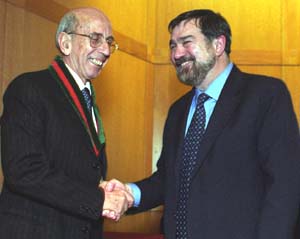Alberto Isidori, Ph.D., was installed Dec. 14 as the first Edwin H. Murty Professor of Engineering. The professorship was made possible by a $1.5 million gift from the estate of Edwin H. Murty.
“Ed Murty was a generous benefactor of the School of Engineering & Applied Science,” said Chancellor Mark S. Wrighton, who announced the gift. “He was fascinated by engineering, understanding how things work and how to improve upon them. With this gift, he has helped advance the mission of the school, and for that we are very grateful.”

Christopher I. Byrnes, Ph.D., dean of the School of Engineering & Applied Science and the Edward H. and Florence G. Skinner Professor of Systems Science and Mathematics, said Murty had attended WUSTL in the 1940s and continued his relationship with the University throughout the years.
“Ed Murty and his wife, Margaret, supported the engineering school in many significant ways, especially with the Murty Electronic Imaging Laboratory in the Department of Electrical and Systems Engineering, as well as a generous scholarship,” Byrnes said. “This professorship is the capstone of his long, philanthropic relationship with our school.”
Isidori has been a professor in the Department of Systems Science and Mathematics (now part of the Department of Electrical and Systems Engineering) in the School of Engineering & Applied Science since 1989. He also holds a joint appointment as a professor of automatic control at the University of Rome.
“Alberto Isidori is a pre-eminent scholar and has produced seminal research that has made great leaps in his field of research,” Byrnes said.
Those research interests include mathematical control theory and control engineering.
One of his early theories was aimed at the extension of “geometric theory” of multivariable linear systems. Using differential geometric methods in the synthesis of feedback laws for nonlinear systems, he was able to develop systematic methods for addressing outstanding design problems like feedback linearization, noninteracting control, disturbance decoupling and model matching.
Since the 1990s, Isidori has focused his research on problems of disturbance attenuation and robust stabilization of nonlinear systems.
A prolific contributor to research literature in his field, he is the author of eight books, more than 90 articles in academic journals and a similar number of papers for conference proceedings, as well as 16 book chapters. In addition, Isidori has edited or co-edited 19 volumes of conference proceedings.
As a result, he is one of the most-cited authors in the “highly cited” database for engineers (isihighlycited.com).
Among his most outstanding achievements are being named a fellow of the Institute of Electrical and Electronic Engineering (IEEE), receiving the International Federation of Automatic Control’s (IFAC) George Quazza Medal, and being given the Bode Lecture Prize from the Control Systems Society of the IEEE.
Isidori is a past president of the European Union Control Associ-ation and also has served as a member of the IFAC Council. He serves or has served on the boards of several leading journals in systems and control, and he has organized several international conferences on feedback design for nonlinear systems.
Murty, a St. Louis native, was born in 1913. He married Margaret Katherine Club in 1966.
His career included a variety of positions with such companies as Radio Research Co., Bendix Radio, Continental Radio and Curtis Wright.
He also had a stint with the Federal Communications Commission in Portland, Ore., and during World War II he served as a radio engineer at the Puget Sound Navy Yard in Bremerton, Wash.
After the war, Murty became a sales engineer and representative for Sprague Electric Co. and also for Continental Carbon Inc., Lavole Labs and Kay Sales Co., from which he retired in the 1970s. He died in 2002.
“We are very grateful for Ed Murty’s contributions to the School of Engineering & Applied Science,” Wrighton said.
“They will be felt for generations to come.”